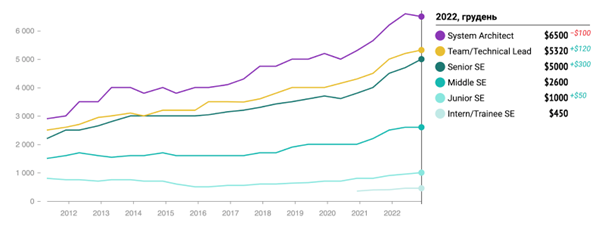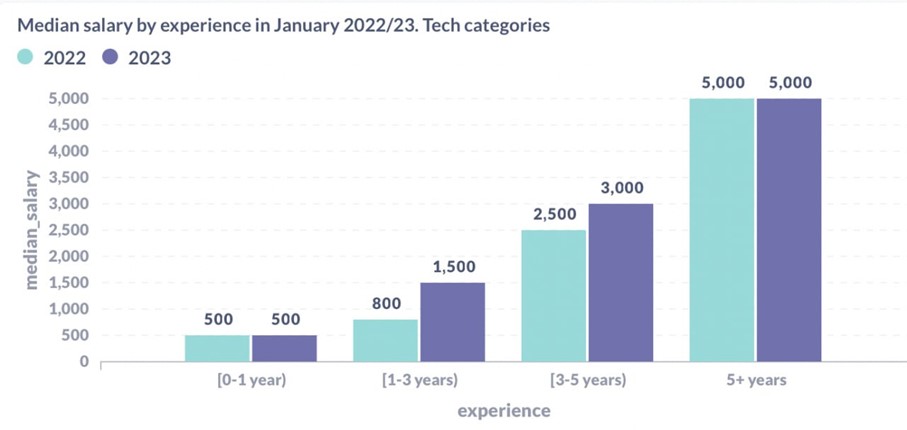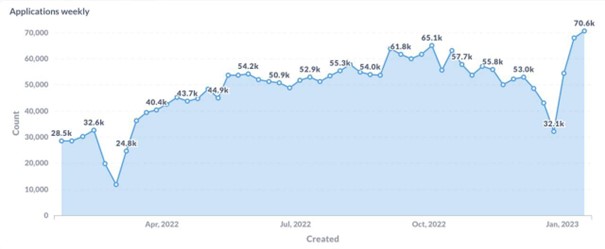How has the war changed remote work in Ukraine?
Date
Reading Time

Share
On this page
- How has the war in Ukraine affected the ability of companies and employees to work remotely?
- Infrastructure and technology challenges
- Adapting to the trend of remote working
- Legal framework of remote work in Ukraine
- Salaries and benefits in Ukraine
- Jobs affected by the war
- The impact of the war on job opportunities
- Benefits and drawbacks of remote work
- Which industries are likely to offer remote work?
How has the war in Ukraine affected the ability of companies and employees to work remotely?
The war in Ukraine has not affected the ability of companies and individual employees to work remotely. Before the war, Ukraine was already one of the world’s largest hubs of technology professionals working remotely for global tech companies. This trend continued during the conflict.
Despite the ongoing war, most tech companies in Ukraine have been able to retain their clients in full or partially, as 52% of companies kept 100% of their contracts, 32% of companies kept 90-99%, and only 16% of companies lost 10% or more of their clients. This is a testament to the resilience and adaptability of the Ukrainian tech industry, which has a strong reputation for delivering high-quality software development services.
As evidenced by the National Bank of Ukraine, the tech industry provided a $7.34 billion currency growth to the nation’s economy and increased export volume by $400 million compared to pre-war 2021 in 2022 alone.
The war has led to an increase in the number of job candidates open to new opportunities, with online applications rising by almost 100%. There are at least 285,000 software developers based in Ukraine; the country awards around 20,000 tech degrees per year, according to the IT Ukraine Association. Most Ukrainian developers could continue their work by relocating to safer locations, with 46% of technology professionals moving to safer regions within Ukraine and beyond. As a result, 84% of software developers could continue working on the products full-time.
One of the reasons for this success is that the COVID-19 pandemic has prepared the industry for remote work, and almost every software developer has the remote working experience and skills to make it productive. In conclusion, while the war in Ukraine has undoubtedly impacted the country’s economy and workforce, Ukraine has demonstrated remarkable resilience in the face of these challenges, and remote work has continued to be a viable and effective option for both companies and employees.
Are there any infrastructure or technology challenges that make remote work difficult in Ukraine?
Ukraine has made great strides in adapting to existing infrastructure and technology challenges. We are confident that the global-first work approach, combined with the resilience and adaptability of Ukrainian talent, will continue to drive success for tech companies.
Despite the massive attacks on Ukraine’s energy sector, where 40% of energy infrastructure objects were damaged, Ukrainian tech companies and people are adapting to existing realities. Ukraine gets thousands of Starlink antennas, diesel generators, and power stations. Every house is equipped with these tools today, so they use a mix of diesel generators, portable power stations, Starlink, and creative work scheduling to maintain productivity.
While there may be occasional disruptions to internet connectivity or power, our experience has been that these are the exception rather than the rule. The vast majority of local developers have reliable internet connections and access to backup power sources.
Also, companies have implemented measures to ensure that their developers have access to the latest technology and infrastructure, and provide training on best practices for remote collaboration and communication to ensure seamless remote work.
How are companies in Ukraine adapting to the trend of remote work, and what are the best practices for remote work in the country?
Companies in Ukraine have adapted exceptionally well to the trend of remote work. Almost 100% of the tech sector in the country is currently working remotely, which amounts to around 300,000 contractors. The country has been forced to adapt quickly to this new reality, and as a result, the talent here has become incredibly versatile and resilient.
Some of the best practices for remote work in Ukraine include strong communication skills, a focus on productivity and efficiency, and a willingness to be flexible and adapt to changing circumstances. Local tech talent is skilled in using the latest collaboration tools and platforms, and they understand the importance of clear communication and regular check-ins with their teams and clients.
How does the legal framework for remote work in Ukraine compare to other countries and what are the key laws and regulations that employers and employees need to be aware of?
Working from home is widespread in Ukraine, and the government has taken measures to regulate and protect it. The Law of Ukraine, “On Amendments to Certain Legislative Acts Concerning Improving the Legal Regulation of Teleworking,” came into force on February 27, 2021, providing social and economic guarantees for employees that work from home. The law distinguishes between two types of work: home work and remote work.
- Homework is a form of work organization in which work is performed by an employee at his place of residence or in other premises specified by him/her, characterized by the presence of a fixed zone, technical means (basic production and non-production assets, tools, devices, inventory) or their combination necessary for the production of products, the provision of services, the performance of work or functions provided for by the constituent documents, but outside the production or working premises of the owner of the enterprise, institution, organization or his authorized body.
- Remote work is a form of work organization in which work is performed by an employee outside the work premises or the territory of the owner or his authorized body, at any place of the employee’s choice, and using information and communication technologies.
Additionally, the Ukrainian government has recently introduced the Diya City initiative, which provides a special tax regime and favorable terms for local and foreign tech companies interested in working or hiring in Ukraine. These measures offer additional protection for tech businesses and talents, making Ukraine an attractive destination for companies looking to hire remote workers.
How are salaries and benefits in Ukraine affected by the war and the broader economic situation in the country?
The ongoing war in Ukraine and the broader economic situation in the country have certainly impacted salaries and benefits for Ukrainian tech professionals. Before the war, salaries were raised almost every quarter, but during 2022, we saw no significant salary increase.
While the devaluation of the national currency and the economic instability caused by the war have led to some salary reductions, Ukrainian tech professionals enjoy relatively competitive salaries compared to their peers in other countries.
In addition to salaries, Ukrainian companies have also adapted by providing various benefits and incentives to attract and retain top talent. These benefits include flexible working arrangements, career growth and professional development opportunities, and a focus on work-life balance.
Are there any specific industries or types or jobs that are more affected by the war than others?
The ongoing war in certain parts of Ukraine impacted various industries and jobs. Specifically, all companies that were not remote-friendly and were situated in the danger zones were affected.
Companies not ready to work remotely or relocate their business suffered the most. These companies lost employees who moved with their families to safer places and lost clients who also relocated. This has been particularly challenging for manufacturing, construction, and retail businesses, which often require physical presence and proximity to customers.
However, industries more easily adaptable to remote work, such as software development, have continued their operations and even thrived despite the challenges.
Will the war impact job opportunities and the overall job market in Ukraine?
While the ongoing conflict in certain parts of Ukraine has undoubtedly impacted the country’s economy, including the job market, the situation is not as dire as it may seem.
According to statistics from Djinni, a leading job platform for technology professionals in Ukraine, the number of job openings is now slightly bigger or the same as the number of candidates. In contrast, before the war, the number of opportunities was twice as bigger as the number of candidates.
Salaries are not growing, and many talented candidates are willing to consider any location options. This is a good time for companies looking to expand software teams with skilled professionals in Ukraine.
What are the benefits and drawbacks of remote work for employees in Ukraine, and how is the work-life balance affected by remote work?
Remote work offers many benefits for employees in Ukraine. Firstly, remote work provides a high degree of flexibility and autonomy, allowing employees to work from anywhere in the country and structure their workdays around their own needs and preferences. They have more control over their work and personal lives now, which can help reduce stress and burnout.
Another significant benefit of remote work is that it eliminates the need for a daily commute. This can save employees time and allow them to use that time for other activities, such as spending time with family, pursuing personal interests, or staying close to their families during the day.
Regarding challenges, there are no significant disadvantages for Ukrainian tech workers. Remote work is an ideal way to continue giving quality services since the industry is well-suited for remote work, and digital communication tools are widely available.
Regarding work-life balance, the war narrowed down travel, tourism, and vacation opportunities. However, tech professionals tend to focus more on their day-to-day work and professional growth, which can result in higher productivity for employers.
What industries and jobs are most likely to offer remote work options in Ukraine?
The technology industry is the most likely to offer remote work options in Ukraine. It’s 100% remote, including tech, HR, marketing, and sales roles, with most companies offering remote work options to their employees. Other industries that are likely to offer remote work options in Ukraine include those that can be done online or from a home office, such as freelance writing, graphic design, and education.
This article was developed in collaboration with GoGloby, a company that specializes in recruiting high-quality software development professionals from LATAM and Eastern Europe. If you’re struggling to find the right talent, GoGloby is here to help.
Latest articles

Overcoming talent shortage in Germany with global hiring

10 awesome remote work rituals you should implement in 2024






